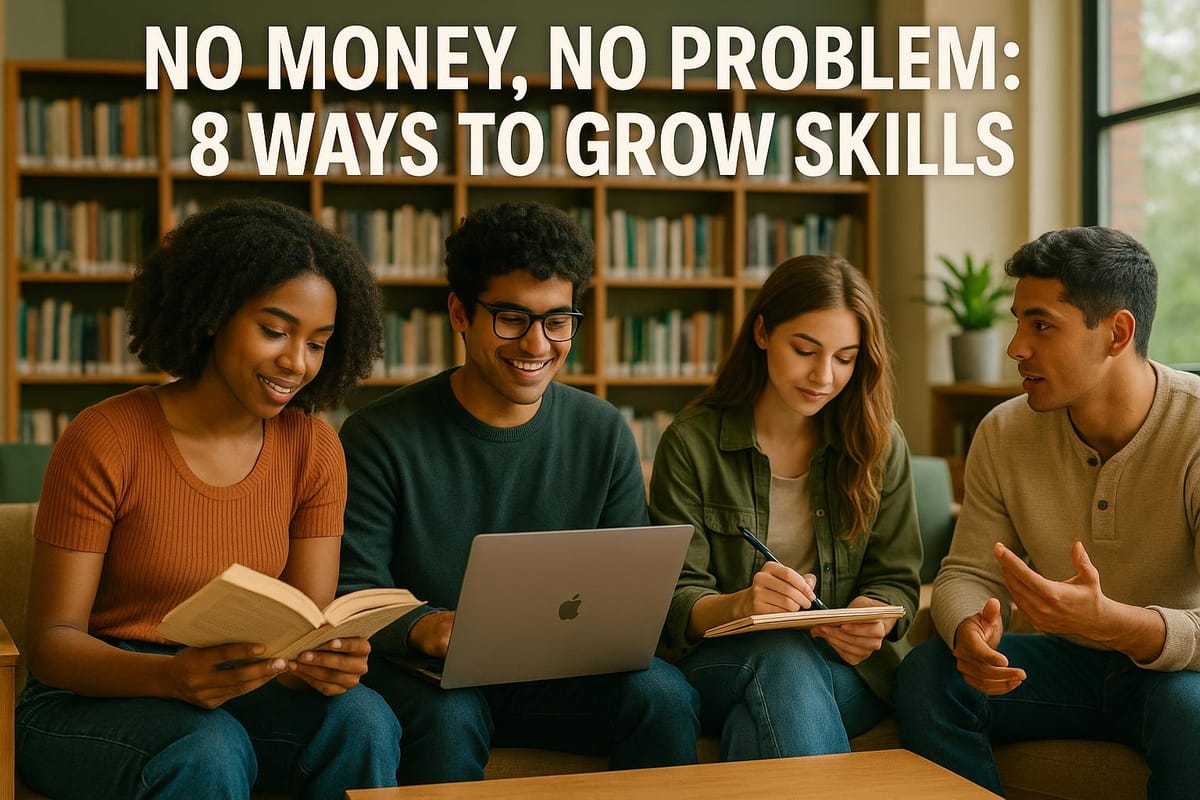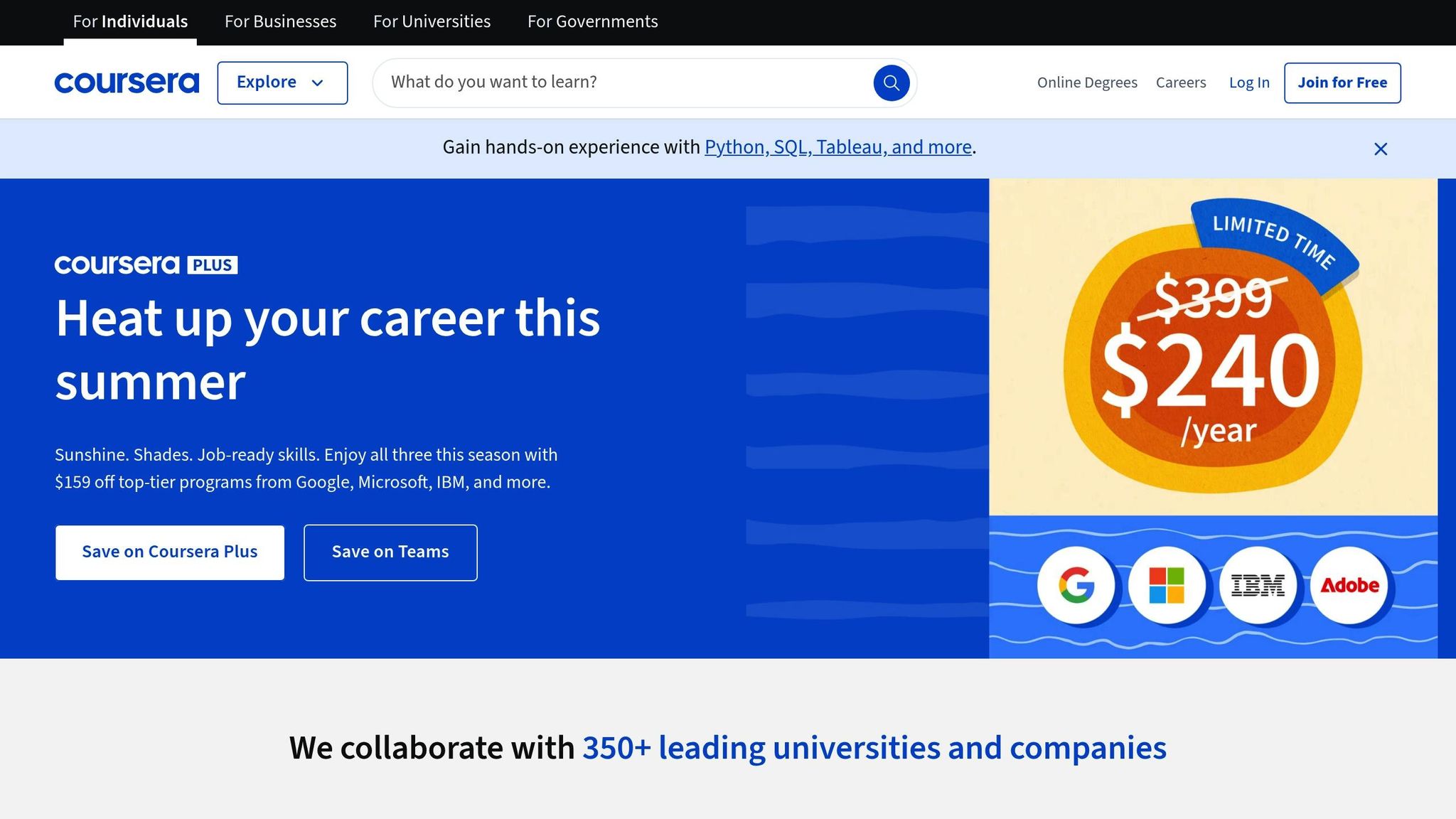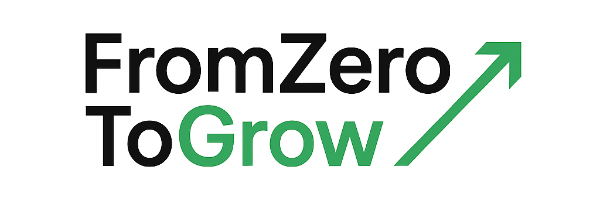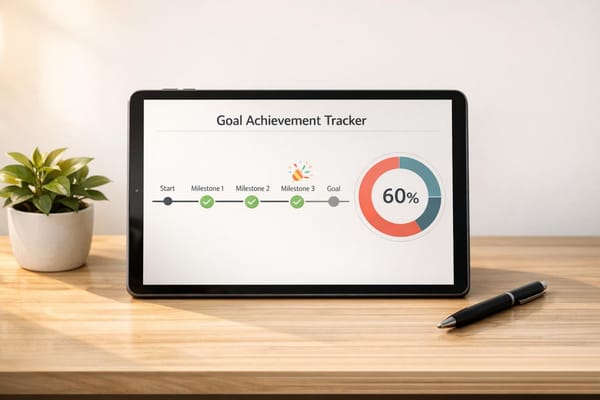No Money, No Problem: 8 Ways to Grow Skills
Explore eight effective ways to develop valuable skills without spending money, from online courses to community programs and self-directed projects.

Want to build skills without spending a dime? Here's how you can do it:
- Free blogs like FromZeroToGrow offer hands-on activities for various age groups.
- Online platforms such as Coursera, Khan Academy, and edX provide free courses in topics ranging from math to programming.
- Public libraries give access to free workshops, career tools, and digital resources like LinkedIn Learning.
- Community programs and volunteering help you gain practical experience in areas like tech, resume writing, or event planning.
- Open-source tools like Linux, TensorFlow, and WordPress let you develop technical skills for free.
- Peer learning groups encourage collaboration, helping you learn from others and share knowledge.
- Mentorship connects you with experienced professionals who can guide your growth.
- Self-directed projects let you apply what you learn, creating a portfolio that showcases your abilities.
Quick Tip: Start small - explore free courses, visit your local library, or try a project that excites you. These methods are flexible, accessible, and perfect for developing both technical and interpersonal skills. Let’s dive into the details!
Top 10 Best Websites to Learn a New Skill for FREE!
1. FromZeroToGrow Blog

The FromZeroToGrow blog is your go-to starting point for building essential skills like fine motor development, gross motor coordination, sensory processing, and executive functioning - and the best part? It’s completely free.
This blog takes a hands-on approach, offering practical activity ideas, fun crafts, and ready-to-use tools. With over 31 posts available in the "Free Resources" section, there’s no shortage of actionable content to dive into.
What makes it even better is the blog’s seasonal updates. Whether it’s a summer activity calendar or festive holiday crafts, the content is designed to keep learning fresh and engaging all year round.
Covering a wide range of skill areas, you’ll find resources for bilateral coordination, handwriting, sensory processing, visual motor integration, and more. Everything is thoughtfully organized by age group, with sections like "Tools for TOTS" and "Tools for TEENS", ensuring activities are tailored to fit different developmental stages.
Don’t miss the Free Resources section, where you’ll find age-appropriate, hands-on activities to strengthen key skills - all without spending a penny. And if you’re ready for more, stick around to learn how free online courses can take your learning even further.
2. Free Online Courses (Coursera, Khan Academy, edX)

Free online courses bring top-notch education from leading universities right to your screen. Platforms like Coursera, edX, and Khan Academy offer thousands of courses covering a wide range of subjects. For instance, Coursera boasts over 5,000 free courses, while edX allows users to audit around 1,000 courses at no cost. Khan Academy, on the other hand, provides entirely free content. With these resources, you’ve got a treasure trove of learning opportunities at your disposal.
These platforms are easy to access and allow you to audit courses for free. While certificates often come with a fee, the knowledge itself is freely available. If you’re just starting, Khan Academy is a fantastic place to build a strong foundation.
Khan Academy is perfect for beginners, offering free lessons in subjects like math, science, and economics. Its step-by-step approach ensures you gain a solid understanding before tackling more advanced material.
Coursera collaborates with over 350 institutions worldwide, and 77% of its learners report career benefits from taking its courses.
"From taking courses on Coursera, I gained a deep understanding of the UX Design process from start to finish. With the knowledge I gained, I feel prepared for entry-level jobs and internships. I've been able to apply the skills and knowledge I gained to multiple projects and work experiences."
– Ryan L., Coursera Learner
edX leans heavily into academic rigor, hosting courses from prestigious universities like MIT, Harvard, and Berkeley. It’s well-regarded for helping learners develop skills and advance their careers.
To get the most out of these platforms, start with one course at a time. For example, you might begin with introductory programming courses on edX or foundational lessons on Khan Academy to build a strong base before progressing to more advanced topics.
Success in online learning requires commitment. Set aside dedicated study times, establish a focused learning environment, and consider supplementing your online coursework with textbooks and personal projects. While the flexibility of these courses is a huge advantage, it also demands self-discipline to stay consistent.
3. Public Libraries
Public libraries are more than just places to borrow books - they’re vibrant community hubs offering free resources to help you develop skills and explore new opportunities. Across the U.S., libraries provide career assistance and learning programs, making them a great place to start your skill-building journey.
Libraries offer access to computers, high-speed internet, and Wi-Fi, helping to bridge the digital divide and connect people to online learning platforms. They also grant free entry to databases, e-books, and research tools that are often hidden behind paywalls.
Career services are a major draw for library users. Surveys show that 88% of state libraries experience medium to high demand for these services. As Martha Hutzel, Director of Central Rappahannock Regional Library (CRRL) in Virginia, aptly says:
"We like to say it's the most valuable card in your wallet."
CRRL is an excellent example of modern library services, offering live online career coaching, workforce reentry support for veterans, and free access to platforms like LinkedIn Learning and UniversalClass - resources that typically require a subscription.
Libraries also emphasize digital literacy. Through partnerships with organizations like AT&T, the Public Library Association has helped 548 libraries host over 3,600 workshops, training more than 23,000 people across 45 states between 2022 and 2025. Many of these programs use DigitalLearn.org, a platform providing free, self-paced courses in both English and Spanish.
The variety of workshops available at libraries might surprise you. You can find classes on conversational English, stock market investing, computer basics, 3D printing, photography, web design, Excel, and even meditation.
Some libraries, like Fayetteville Public Library, go a step further by offering workforce training in areas like construction, IT, and culinary arts. They use cutting-edge tools, including virtual reality simulations for skilled trades certification, IT training that combines in-person and online sessions, and ServSafe® certification for those in culinary fields.
Makerspaces are another highlight of many libraries. These creative areas provide access to tools like 3D printers, robotics kits, and crafting supplies, enabling hands-on learning and skill-building that might otherwise be out of reach due to cost.
Getting started is simple - just get a library card and check your local library’s website for upcoming programs and workshops. Librarians are also an invaluable resource, offering guidance to refine your research skills or improve your study techniques. Many libraries cater to specific age groups and interests, with programs ranging from STEM education for kids to genealogy research using AI tools.
Libraries thrive on accessibility and community focus. They often collaborate with local schools, businesses, and organizations to tailor their services to the needs of the community. Outreach programs also help underserved populations overcome barriers like transportation or lack of technology.
While public libraries offer a wealth of opportunities, they’re just one piece of the puzzle. Community programs and local workshops can further enhance your hands-on learning experience.
4. Community Programs and Local Workshops
Community programs and local workshops offer a fantastic way to combine self-learning with practical, hands-on experience right in your area. These initiatives cover a wide range of skills, from tech essentials like Excel and Word to career-focused areas such as resume writing and interview preparation. Beyond traditional classes, participating in these programs - especially through volunteering - can provide invaluable, real-world learning opportunities.
Volunteering isn’t just about giving back; it’s a crash course in essential skills like communication, time management, teamwork, and adaptability. Plus, it helps build resilience while making a meaningful impact in your community.
One of the hidden perks of volunteering is discovering talents you didn’t know you had. For instance, helping at a nonprofit’s fundraising event could reveal a flair for event planning. Or, managing their social media might uncover latent marketing skills.
A great example is Debra Spencer, who received Penn Foster's Helping Hands Award in 2020. She used her tech expertise to assist her community and support local events, demonstrating how volunteering can blend skill-building with service.
For quick access to local skill-building resources, dial 211 or explore findhelp.org, a treasure trove of free or low-cost community programs. Additionally, your state’s labor department website often lists job training programs and workshops. The Department of Labor’s CareerOneStop website is another excellent resource, offering details on opportunities, including programs available through TANF. Many community-based and faith-based organizations also provide a variety of educational, social, and recreational services, often funded by the Office of Community Services.
When you find a volunteer opportunity that excites you, reach out to the volunteer manager. Share your goals, and they might connect you with an expert or assign tasks that align with the skills you want to develop.
Don’t stop there - research local nonprofits, community centers, and organizations that align with your interests. Attend their workshops, webinars, or training sessions to deepen your volunteer experience while building new skills. These programs often focus on industry-specific topics, offering affordable, hands-on learning opportunities.
Whether you’re drawn to healthcare, education, environmental work, or social services, there’s likely a local group ready to provide the experience and training you’re looking for. Community programs not only help you develop practical skills but also serve as a stepping stone to other free resources. They’re even more effective when paired with the right tools and software for practice and application.
5. Open-Source Tools and Software
Open-source tools are a treasure trove for skill development, often overlooked despite their immense potential. These freely available software solutions match the capabilities of costly proprietary tools, offering a budget-friendly alternative. With over 90% of organizations using open-source tools, they’ve been shown to accelerate development by 73%, cut licensing costs by an average of 67%, and roll out features 3.2 times faster. These benefits make open-source tools invaluable across a wide range of industries.
Open-source tools cater to nearly every field you can think of. In software development, Linux stands out as a customizable operating system favored for its flexibility. Tools like Docker simplify application deployment, while Kubernetes manages containerized applications at scale. A notable example is Spotify, which transitioned over 150 microservices to Kubernetes in 2018, dramatically improving deployment speed and resource efficiency.
For data science, tools like TensorFlow and PyTorch power machine learning projects, while PostgreSQL and MongoDB handle database management. In web development, WordPress - which powers over 40% of websites globally - is an essential platform to learn.
Learning these tools not only sharpens your technical skills but also equips you to tackle complex, real-world challenges. Take NASA's Ingenuity helicopter, for instance. It relied on a Linux-powered system during its groundbreaking Mars flights in 2021, showcasing the reliability and capability of open-source technology.
How to Get Started
If you’re new to open-source, start by evaluating your current skills and finding projects that align with your interests. Look for repositories with labels like "good first issues" or "beginner-friendly" to ease into the process. For instance, the Job Scraper project is a great way for beginners to practice and refine their skills. Clear documentation and supportive communities make these projects welcoming for newcomers.
Before diving in, review the README and CONTRIBUTING guides of any project. These documents outline the workflow and contribution guidelines, saving you from unnecessary confusion. Engaging with the community is another key step. Join project communication channels, introduce yourself, and don’t hesitate to ask questions. Open-source development thrives on collaboration, and you’ll be learning alongside seasoned developers from around the world.
As Richard Branson once said:
"If somebody offers you an amazing opportunity but you are not sure you can do it, say yes - then learn how to do it later!"
Start small to build confidence. Begin with minor tasks like fixing bugs or improving documentation before taking on more complex features. Create a test environment to experiment without impacting the main project. Each contribution, no matter how small, showcases your initiative, communication skills, and eagerness to learn - qualities that employers notice and value.
Support and Growth in Open-Source
Organizations like the Apache Software Foundation, the Linux Foundation, and the Open Source Geospatial Foundation (OSGeo) provide excellent resources and support for open-source contributors. These platforms can guide you as you navigate the learning curve.
Patience is essential. Open-source learning takes time, especially as you get familiar with workflows and coding standards. Don’t get discouraged if progress feels slow at first. Every contribution builds your expertise while creating a public portfolio - a powerful asset when job hunting.
Open-source tools are more than just software; they’re a gateway to a global community that values collaboration, creativity, and shared knowledge. By embracing these tools, you’ll not only develop new skills but also connect with like-minded individuals who share your passion for learning and growth - all without spending a dime.
6. Peer Learning and Study Groups
Peer learning groups are an effective and entirely free way to build skills while fostering collaboration. Learning alongside peers creates an environment where shared knowledge and diverse perspectives flourish. By joining or forming a study group, you tap into collective expertise without spending a dime. In fact, 55% of employees prefer learning from colleagues over formal training programs, which speaks to the natural appeal of peer-to-peer learning.
The real strength of peer learning lies in its collaborative nature. As Seneca wisely noted, "While we teach, we learn", a sentiment that captures how every session not only enhances your understanding but also reinforces your expertise as you engage with others.
Organizations that embrace collaborative learning cultures see 23% higher performance compared to those that stick to traditional hierarchical models. This is because peer learning develops not only technical skills but also soft skills like communication, teamwork, and leadership - qualities that are highly sought after in today’s workplace.
Building Your Peer Learning Network
Start by identifying peers who have complementary skills and share similar learning goals. Seek out individuals who are dedicated and prepared to contribute meaningfully to group sessions. A group of three to four people works best, as it allows everyone to actively participate while keeping discussions focused.
A great example of structured peer learning comes from LinkedIn’s Conscious Business program. Employees joined four-week, cohort-based programs that required just one hour of live interaction per week. They practiced skills with peers, applied them in their roles, and continued sharing insights long after the program ended. The result? Employees felt energized and empowered.
Structuring Effective Sessions
Consistency is key for successful peer learning. Aim to meet weekly for 60–90 minutes, striking a balance between maintaining momentum and respecting busy schedules. Rotate the role of facilitator to guide discussions and ensure everyone stays engaged.
Set clear ground rules: take turns speaking, come prepared, foster a judgment-free environment, and focus on collaboration rather than competition. Creating a space of psychological safety, where members feel comfortable sharing and providing honest feedback, is essential.
Maximizing Learning Through Structure
A well-structured session can make all the difference. Begin with a quick review of the prior week’s material, then move into rotating member-led discussions. Wrap up with a summary and set clear goals for the next meeting. Incorporate real-world scenarios to make the learning practical and actionable.
Keep track of what your group has covered and document goals for future sessions. This approach ensures accountability and steady progress.
Leveraging Technology for Collaboration
Digital tools can make peer learning even more effective. Platforms like Google Docs enable collaborative editing, while Microsoft Teams is excellent for organizing discussions. Tools like Trello can help manage timelines and keep everyone accountable, and Slack centralizes messaging and file sharing for seamless communication.
For those who prefer visual learning, tools like Padlet support creative brainstorming, and Miro is ideal for mapping out complex ideas. These technologies help your group stay connected and productive, even between in-person meetings.
Beyond the practical benefits, these tools also help strengthen the connections within your group, which can lead to even greater opportunities.
The Networking Advantage
Peer learning groups aren’t just about skill-building - they’re also incredible networking opportunities. 82% of leaders report forming valuable connections with people they’ve trained alongside. These relationships often evolve into mentorships, partnerships, or new career opportunities.
Organizations that combine five or more development approaches, blending both individual and group activities, are 4.9 times more likely to see improved capabilities. Peer learning complements other methods, adding depth and variety to skill-building strategies.
By bringing together diverse perspectives and experiences, peer groups expose you to alternative approaches and fresh ideas that you might not encounter on your own. This process not only accelerates learning but also sharpens critical thinking - skills that are invaluable in any career.
In short, peer learning goes beyond skill development, offering a chance to grow your professional network and open doors to new opportunities.
7. Mentorship and Networking
Expanding on the collaborative nature of peer learning, mentorship and networking can unlock even more opportunities for personal and professional growth. These approaches, built on real human connections, provide invaluable learning experiences at no cost. In fact, 90% of employees report being happier with a mentor, and companies with mentoring programs see retention rates soar by 50%.
Ecommerce entrepreneur Trilce Jiron puts it perfectly:
"Everyone needs a mentor in their career, just like you want friends that inspire and support you in your everyday life. Your method is your own. Find a mentor who is constant in your life and can give you advice on things you're not good at. I'm horrible with business administration and finances, so I found a mentor who guides me through those weekly topics."
Finding Mentors Without Spending a Dime
The beauty of mentorship lies in its accessibility - mentors often share their insights for free. To find the right mentor, you can start by tapping into your current network. Reach out to former colleagues, professors, or industry professionals whose expertise you admire. Many are happy to offer guidance, especially when approached with respect and clear, specific questions.
If you're looking to expand your search, organizations like SCORE offer free advice from seasoned business mentors across the U.S.. Similarly, your local Small Business Development Center (SBDC) connects you with volunteer mentors who can help tackle skill-building challenges.
Digital platforms also make it easier to find mentors. For example, LinkedIn, with its massive user base, allows you to research professionals and send personalized connection requests.
Smart Networking Strategies
Networking isn’t just about collecting business cards - it’s about creating real, mutually beneficial relationships. Platforms like Meetup, with its 60 million users, provide countless opportunities to meet professionals through industry-specific events.
Start by asking thoughtful questions to show genuine interest. Cold outreach can also be effective if done right. Research your potential mentor, show an understanding of their work, and offer something valuable in return. This preparation shows respect and increases your chances of building a meaningful connection.
Choosing the Right Networking Platforms
Different platforms cater to different needs, so it’s important to choose one that aligns with your goals. Here’s a quick comparison:
| Platform | Focus | Best For | Cost |
|---|---|---|---|
| Professional networking | Industry connections, job hunting | Free basic, Premium $29.99/month | |
| Meetup | Local events | In-person networking | Free to join, organizer fees apply |
| GitHub | Developer community | Sharing technical skills | Free basic plan |
| Industry Forums | Niche expertise | Knowledge sharing | Usually free |
For developers, GitHub is a goldmine for collaboration and mentorship opportunities. Similarly, designers can connect with experienced professionals on Dribbble, where feedback and guidance are readily available.
Building Strong Mentor Relationships
Finding a mentor is just the start - building a meaningful relationship takes effort. Start by doing your homework. Show your mentor that you’re serious by researching their background and expertise.
A successful mentorship is a two-way street. Look for ways to provide value, whether it’s helping with research, offering fresh ideas, or supporting their projects on social media [77, 79]. When your mentor gives advice, act on it promptly and share your results. This not only shows your commitment but also strengthens the relationship.
The Ripple Effect of Networking
Mentorship and networking can have a lasting impact. According to a UPS survey of over 180 business owners, 70% of those with mentors had businesses that lasted five years or more, doubling the survival rate of those without mentors. Mentors provide insights, help you avoid costly mistakes, and often connect you with opportunities you might not have discovered on your own. Every meaningful connection can lead to new collaborations and learning experiences that go far beyond formal qualifications.
Using Technology to Build Relationships
In today’s world, networking isn’t limited to face-to-face interactions. Platforms like X (formerly Twitter) allow you to engage with industry leaders by thoughtfully interacting with their posts. Another option is joining mastermind groups, where professionals with complementary skills come together to share challenges and solutions.
The key to successful digital networking? Be authentic. Focus on building genuine connections rather than simply expanding your contact list. As Michael Jackson once said:
"The greatest education in the world is watching the masters at work."
8. Self-Directed Projects and Small Learning Sessions
If you want to truly solidify your skills, start building something real. Self-directed projects give you hands-on experience and help you create a portfolio that speaks louder than any resume ever could.
The beauty of these projects is their flexibility. You can start small, focusing on topics that genuinely excite you, and gradually expand your efforts. When you're passionate about what you're learning, staying engaged becomes second nature. Now, let’s dive into how you can kick off your first project.
Starting Your First Project
The first step is to pinpoint what excites you the most. Think about your interests and how they can align with practical skill-building. For example, if writing is your thing, try crafting short stories or essays. If coding fascinates you, build a simple app using free platforms like code.org. The idea is to start with something you care about - it’ll keep you motivated and eager to learn.
Why This Learning Process Works
What makes self-directed projects so effective is that they teach you how to learn, not just what to learn. This distinction is key for long-term growth. Through these projects, you naturally develop skills like problem-solving, creativity, collaboration, and time management. It’s a hands-on approach that embodies the FromZeroToGrow philosophy: learning by doing.
Crafting Your Action Plan
To make real progress, follow a structured framework: investigation, planning, action, reflection, and demonstration. Start by researching your topic thoroughly. Then, create a timeline and a realistic action plan. Push yourself, track your progress, and share your results. A helpful method is the MISO approach - gathering insights from media, interviews, surveys, and direct observation - to ensure you’re building a well-rounded understanding.
Connecting Passion to Broader Goals
Once your action plan is in motion, take your project to the next level by linking it to larger societal issues. For example, you could align your work with global challenges using frameworks like the Sustainable Development Goals. This not only adds depth to your project but can also connect you with others who share your vision.
The best part? You don’t need expensive tools or formal training to get started. A smartphone can handle video recording, free software can take care of editing, and public spaces can serve as venues for your events. Your curiosity and drive are your most valuable resources.
Whether it’s learning guitar, writing slam poetry, building a treehouse, or developing a mobile app, self-directed projects turn theory into real-world skills. They allow you to showcase tangible achievements that can impress employers, collaborators, or clients - all without spending a fortune on formal education.
Method Comparison Chart
Here’s a handy chart to help you match learning methods to your specific needs and goals.
| Method | Ease of Access | Time Commitment | Best For | Skill Types |
|---|---|---|---|---|
| FromZeroToGrow Blog | High – Requires internet access | Flexible | Quick tips and inspiration | General skill development, motivation |
| Free Online Courses | High – 87% of Coursera users report career benefits | Flexible | Structured learning with certificates | Technical, analytical, creative skills |
| Public Libraries | High – Available in most U.S. communities | Flexible | Research and quiet study | All skill types, especially analytical |
| Community Programs | Medium – 548 public libraries conducted over 3,600 workshops across 45 states | Flexible | Hands-on practice with others | Interpersonal, creative, technical skills |
| Open-Source Tools | High – Requires technical setup | Flexible | Learning by doing | Technical skills, creative projects |
| Peer Learning Groups | Medium – Requires finding or forming groups | Flexible | Discussion and collaboration | Interpersonal, soft skills, problem-solving |
| Mentorship | Medium – Depends on connections | Flexible | Personalized guidance | Leadership, strategic thinking, career skills |
| Self-Directed Projects | High – Requires self-discipline | Flexible | Building portfolio and real experience | All skill types, especially creative and technical |
This chart highlights how each method aligns with different learning preferences. Use it to determine which approach fits your pace, goals, and lifestyle.
- Technical skills are often best developed through structured online courses and hands-on experience with open-source tools.
- Creative skills flourish with hands-on projects or interactive community workshops.
- Interpersonal skills grow through peer learning groups, mentorship, or community programs that encourage collaboration and communication.
When choosing a method, consider your current situation and schedule. If you’re working full-time, options with flexible scheduling - like online courses or self-directed projects - might fit better than methods requiring fixed meeting times. For those who thrive on structure and deadlines, formal online courses can provide the necessary framework. Alternatively, if you value human interaction, mentorship or peer learning groups may offer the engagement you need.
Keep in mind that different skills call for different strategies. Technical skills are often easier to measure, while abstract skills, such as strategic thinking, may require more nuanced approaches. By aligning your learning method with your skill type and lifestyle, you can maximize your growth without spending a cent.
Skill-building is a long-term journey. Consistency matters more than speed, so choose methods that you can stick with over time. Combining a few approaches - like online courses, self-directed projects, and mentorship - can often yield the best results. This comparison shows that zero-cost options can empower you to develop skills, no matter where you’re starting from.
Conclusion
Free resources can be a game-changer, offering opportunities for growth without financial barriers. Whether you're just beginning or looking to sharpen your skills, these no-cost tools provide real ways to expand your knowledge and abilities.
The methods shared earlier put the power of learning directly in your hands. The key is finding what works best for your learning style and schedule. Prefer a structured approach? Dive into free courses on platforms like Coursera or edX. If you're more of a hands-on learner, community workshops or personal projects might suit you better. And if building connections motivates you, mentorships or peer learning groups could be your go-to.
"If you don't design your own life plan, chances are you'll fall into someone else's plan. And guess what they have planned for you? Not much." - Jim Rohn
Start small - choose one or two methods that feel manageable for now. Keep in mind, self-discipline is key. As digital marketer Stan Tan explains: "Self-discipline means doing something that you should be doing whether you feel like it or not. Motivation is only a short-term thing".
Set clear, achievable goals to stay on track. For example, commit to completing a JavaScript tutorial on Khan Academy twice a week. A SWOT analysis can also help you map out your strengths, weaknesses, opportunities, and threats. Use this to create a focused plan, listing your top skills and actionable steps for improvement.
One of the best things about free resources is their flexibility. You can learn at your own pace, explore interests without pressure, and adapt to your schedule. With 41% of employees concerned about the rapid obsolescence of work skills due to technological advancements, staying ahead through continuous learning isn't just a bonus - it's a necessity.
Don’t wait. Take the first step today - visit your local library, sign up for a free online course, or reach out to a mentor. The tools are there, ready for you. By starting now, you’re not just building skills - you’re investing in a better future. Your future self will thank you.
FAQs
What’s the best way to combine free resources to build new skills effectively?
To get the most out of free resources, start by defining clear learning objectives. Knowing what you want to accomplish will help you choose the right mix of tools and platforms. For instance, you can take advantage of free online courses to build a solid foundation of knowledge, and then reinforce those concepts by using open-source tools or tapping into community resources like public libraries.
It’s helpful to create a simple plan that balances learning and practice. For example, you could focus on studying theoretical concepts during the weekdays and set aside weekends for hands-on application. By blending structured learning with practical experience, you’ll develop your skills in a well-rounded way - without spending a single dollar!
How can I stay motivated and focused while taking free online courses?
Staying motivated and focused while tackling free online courses can feel like an uphill battle, but a few practical strategies can make all the difference. First, establish a regular study routine and set specific, achievable goals to keep yourself moving in the right direction. Having a quiet, dedicated space for studying - free from distractions - can also help you stay in the zone.
Connecting with others is another great way to stay motivated. Participate in discussion forums or join study groups to create a sense of accountability and shared purpose. Breaking larger tasks into smaller, manageable steps and celebrating even the smallest victories can help build momentum and confidence. To stay on top of deadlines and keep everything organized, consider using tools like planners or apps to schedule study sessions and set reminders. These small adjustments can make your learning journey smoother and more rewarding.
How can I connect with a mentor to help me grow my skills without spending any money?
Finding a mentor without spending a dime is more accessible than it might seem. Start by checking out nonprofit organizations like SCORE, which pairs individuals with seasoned volunteer mentors skilled in business and professional growth. Another great option is to explore community programs or local networking groups that often offer free mentorship opportunities.
You can also turn to online platforms designed for mentorship. Many of these services provide free options to connect you with professionals in your industry of interest. These resources give you access to valuable advice and support, allowing you to develop your skills without breaking the bank.





